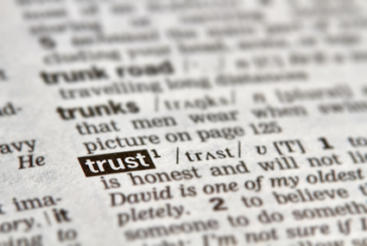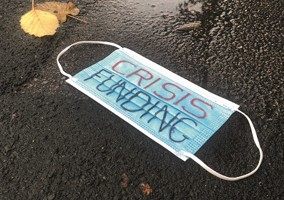Every charity wants to think of itself as trusted. Many are involved in sensitive issues and relationships which require a high degree of trust on both sides, and even those that aren't still require the consent of their beneficiaries.
The Charity Commission's regular research on public trust in charities always, therefore, generates plenty of interest. This year's shows that charities' mean trust score has improved from 6.2 to 6.4 out of 10 since last year, though the figure is still slightly below where the sector was before a series of high-profile scandals commenced in 2015.
Unfortunately, these sort of headline figures are crude and not entirely helpful. Part of the problem is that trust is complex and nuanced, and not always simple to identify and articulate, let alone measure.
Consider the sitcom trope of a fighting couple attending marriage counselling, where they take part in a trust exercise involving one of them falling backwards into the other's arms. Their partner turns away and fails to catch them (cue the canned laughter).
However, by the end of the episode something else has brought them back together and they have made up. In the slapstick moment it appeared there was no trust, yet on a deeper more meaningful level, trust was there all along.
That's not to say that the overall trust score has no value. But it must be interpreted carefully.
‘More trusted than the man on the street’
It is also necessary to be careful when comparing this figure with that of other groups.
When the sector posted low scores of 5.7 and 5.5 in 2016 and 2018, we spent years listening to the then chair of the Commission lamenting how charities were less trusted than the “ordinary man / woman on the street”.
On the face of it, then, it is good news that charities are now firmly ahead of ordinary people, who scored 5.6 this year. Doctors and the police still score more highly than charities, with 7.7 and 6.5 respectively, but charities are comfortably ahead of government ministers (4.1) and local councils (5.4).
However, this shouldn’t be seen as some kind of victory. While seeing how others fare can be useful to contextualise the charity score, it still doesn't tell us much about how trust is earned and maintained.
Charities are not in competition with other sectors – trust is not finite or limited. No one has ever encountered a fundraiser and thought: “Sorry mate, just used up all my trust at the doctor’s, there’s none left for you.”
In fact, society would be healthier and happier if there was a bit more trust all around. *Insert here the regular joke about how you probably shouldn't trust this article because newspapers and journalists always do poorly on trust scores.*
Actually, one of the striking things about this year’s trust research is that almost all the groups experienced a small uplift in their score. Even MPs saw their score rise by 0.2 to 4.0, while newspapers were up by 0.3 to 4.3. The police were the only ones not to experience an increase, and their score remained level with the previous year.
Added together, this means that there is 2.8 more trust this year compared to last year, so again, while we can be cautiously positive, perhaps it is worth considering what has driven that trend.
The public are inconsistent
One of the key things that charities can take away from this research is the fickleness of “the public”.
Perhaps because people very rarely pay attention to the granular detail, they often behave inconsistently and are prone to holding contradictory opinions.
This can be seen in this year’s trust report, where newspapers come third from bottom in the overall trust ranking, yet apparently have a big sway when it comes to how people decide to donate to charities.
Indeed, three-quarters of people said they were confident about information about the cause that they see on television and in newspapers, and 60% said they use this information to help them decide whether to donate.
Other sources of information about charities
That's not to say that mainstream media is the public's only influential information source. Some 69% of people use the opinions of friends and family to make decisions about donations, while 63% use a charity’s own website.
At the other end of the scale, just 35% of respondents use the Commission's register of charities to make decisions about donations, even though 85% consider it a trustworthy source of information.
Social media fares not much better, with just 44% using it to make decisions about donations, and not only that but only 56% see it as reliable.
So how can charities interpret this information?
Well, firstly it underscores the importance of having a good website that really helps to tell your charity’s story.
Secondly, people put a lot of stock in the opinions of other people. This is a often a positive thing, but equally, one person's negative experience can have a multiplier effect on the opinions of others.
And finally, people very often say one thing and do the opposite, so it is important to take opinion poll findings with a pinch of salt.
Related articles











